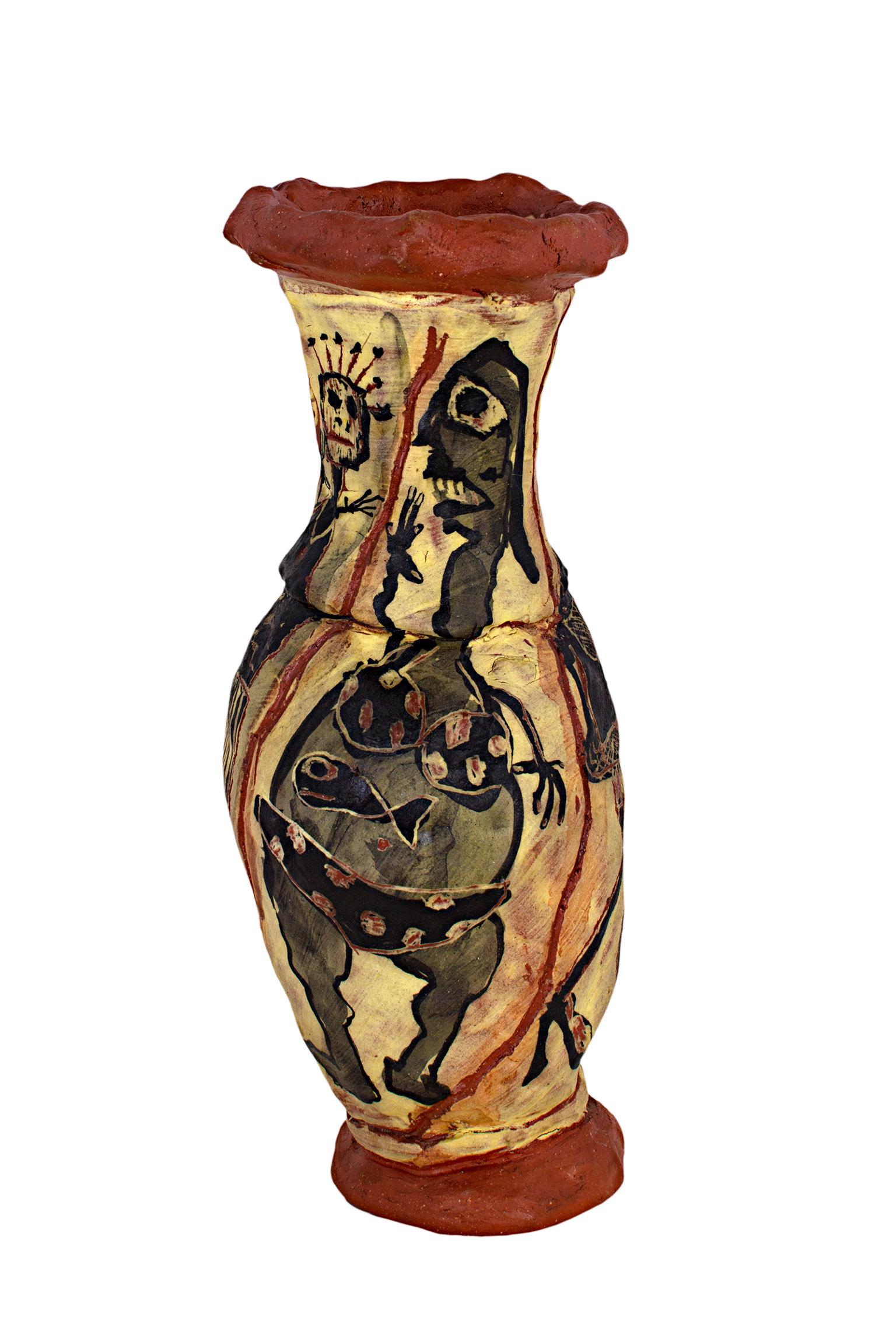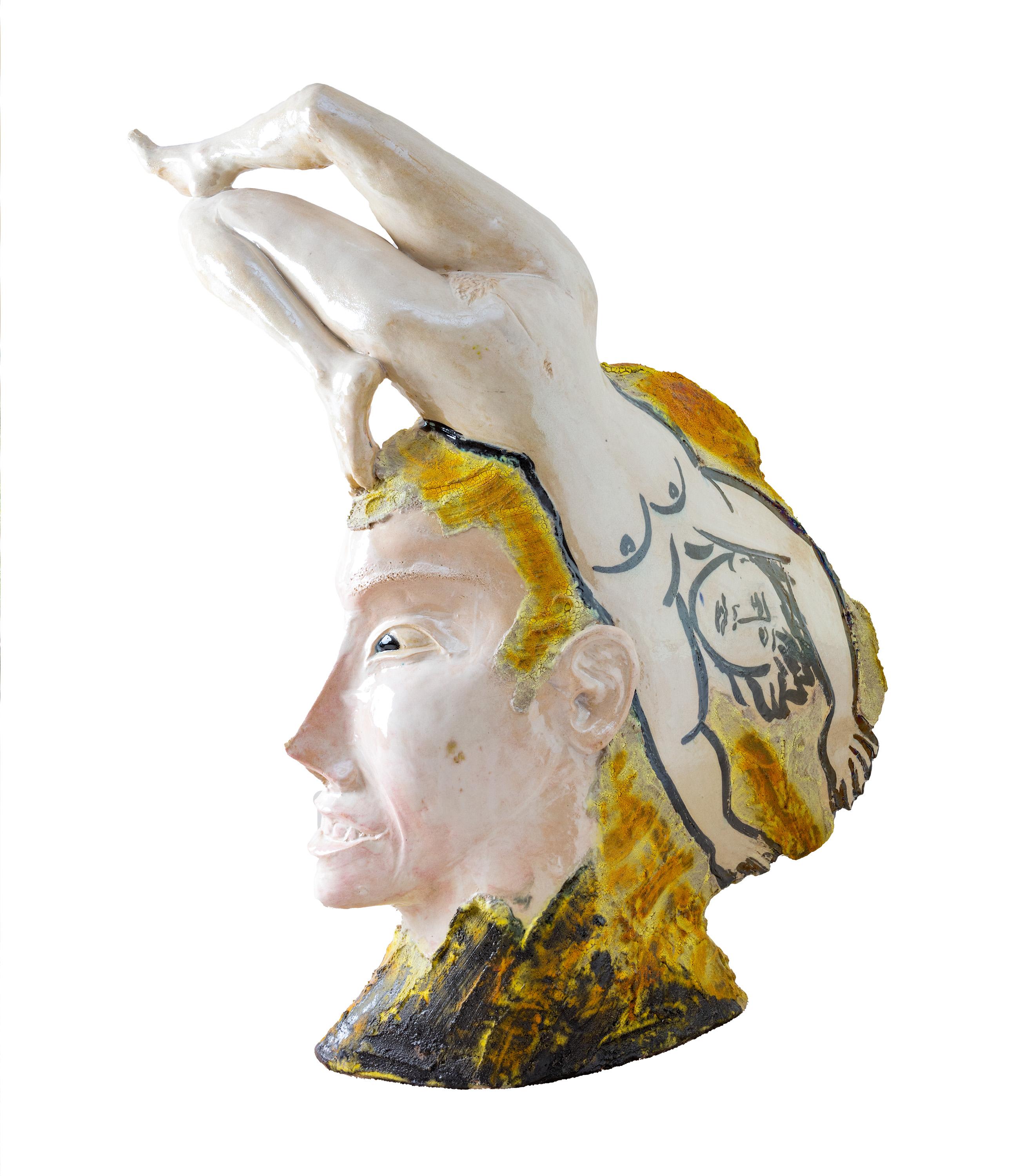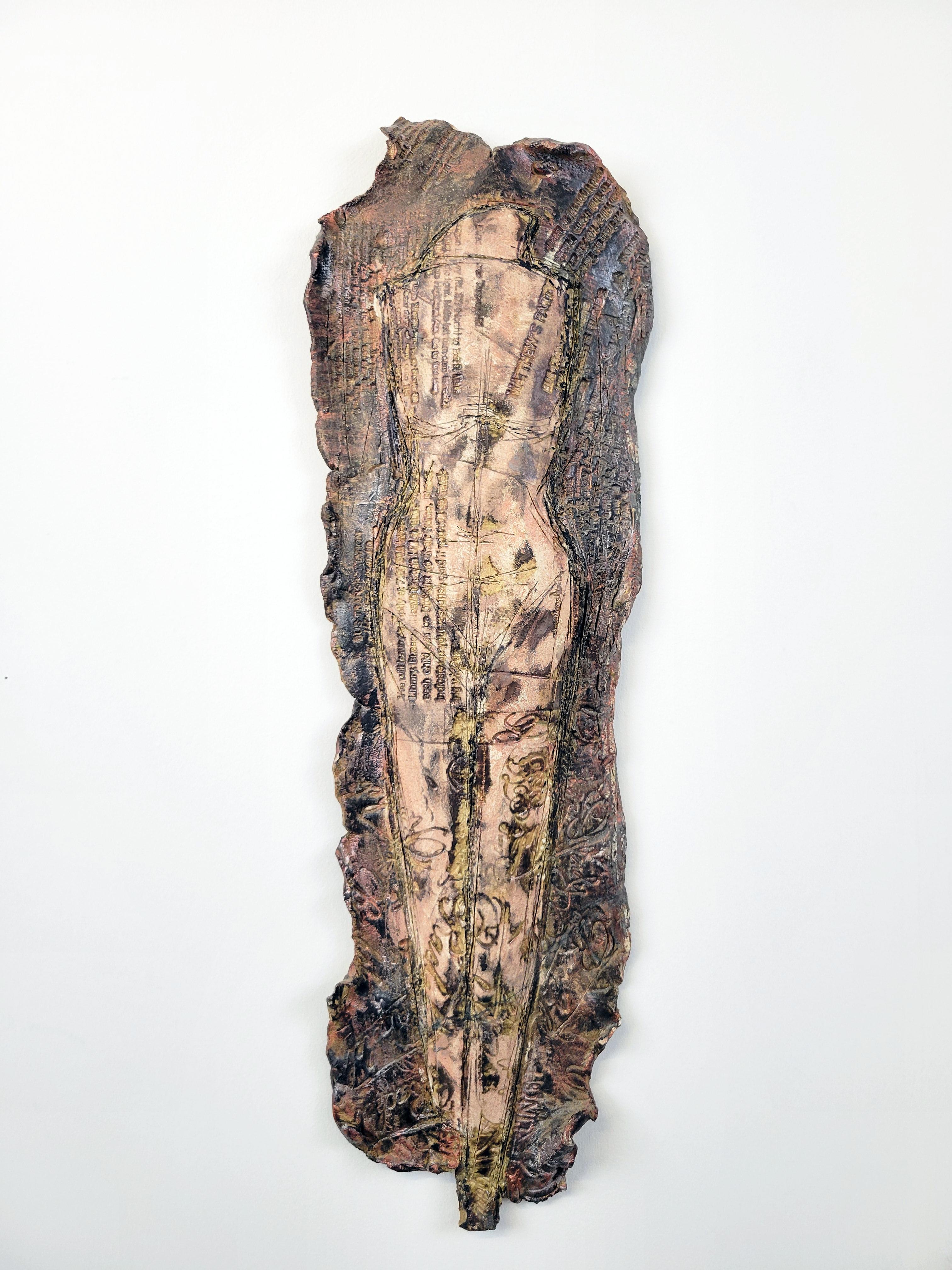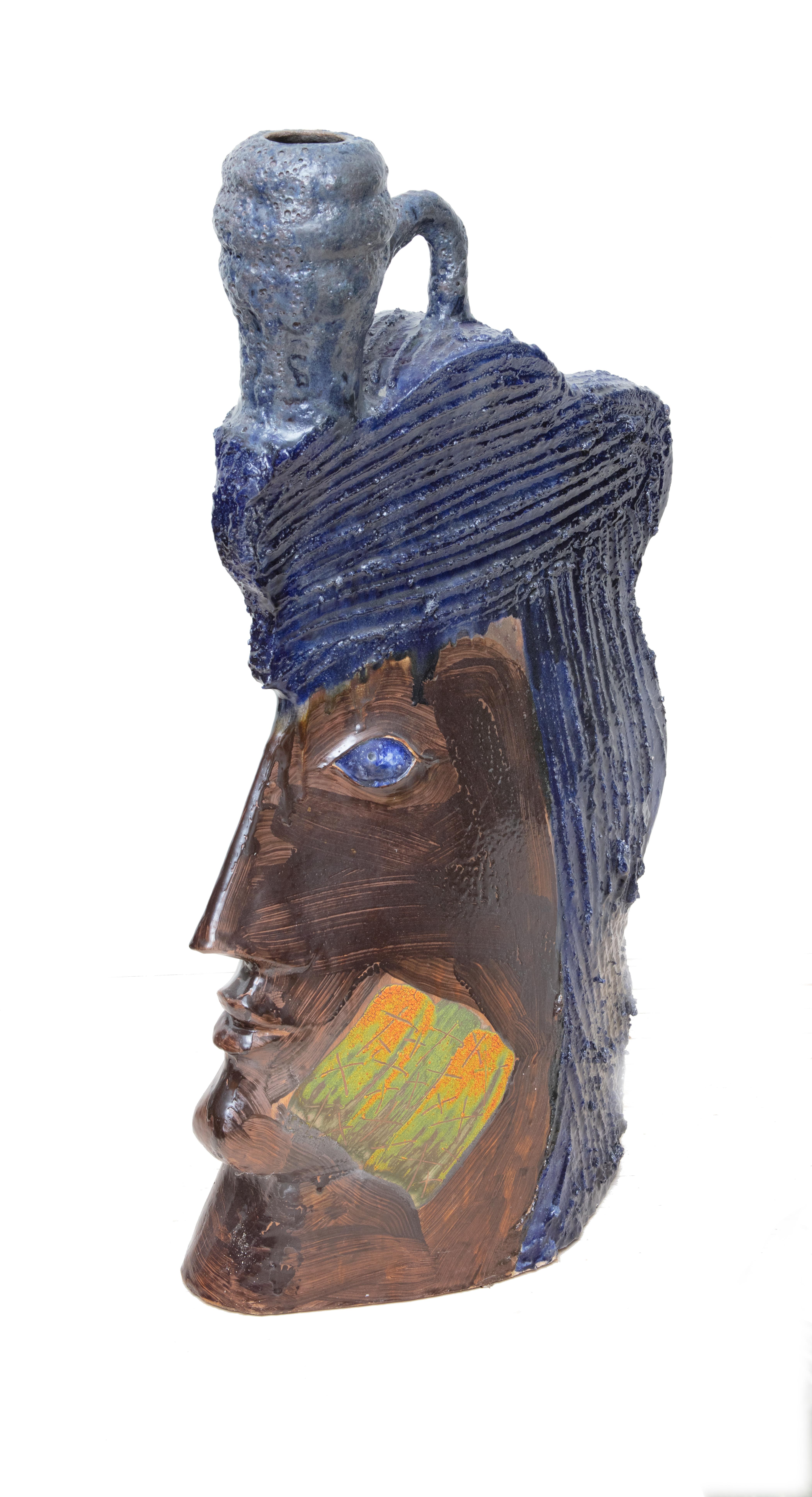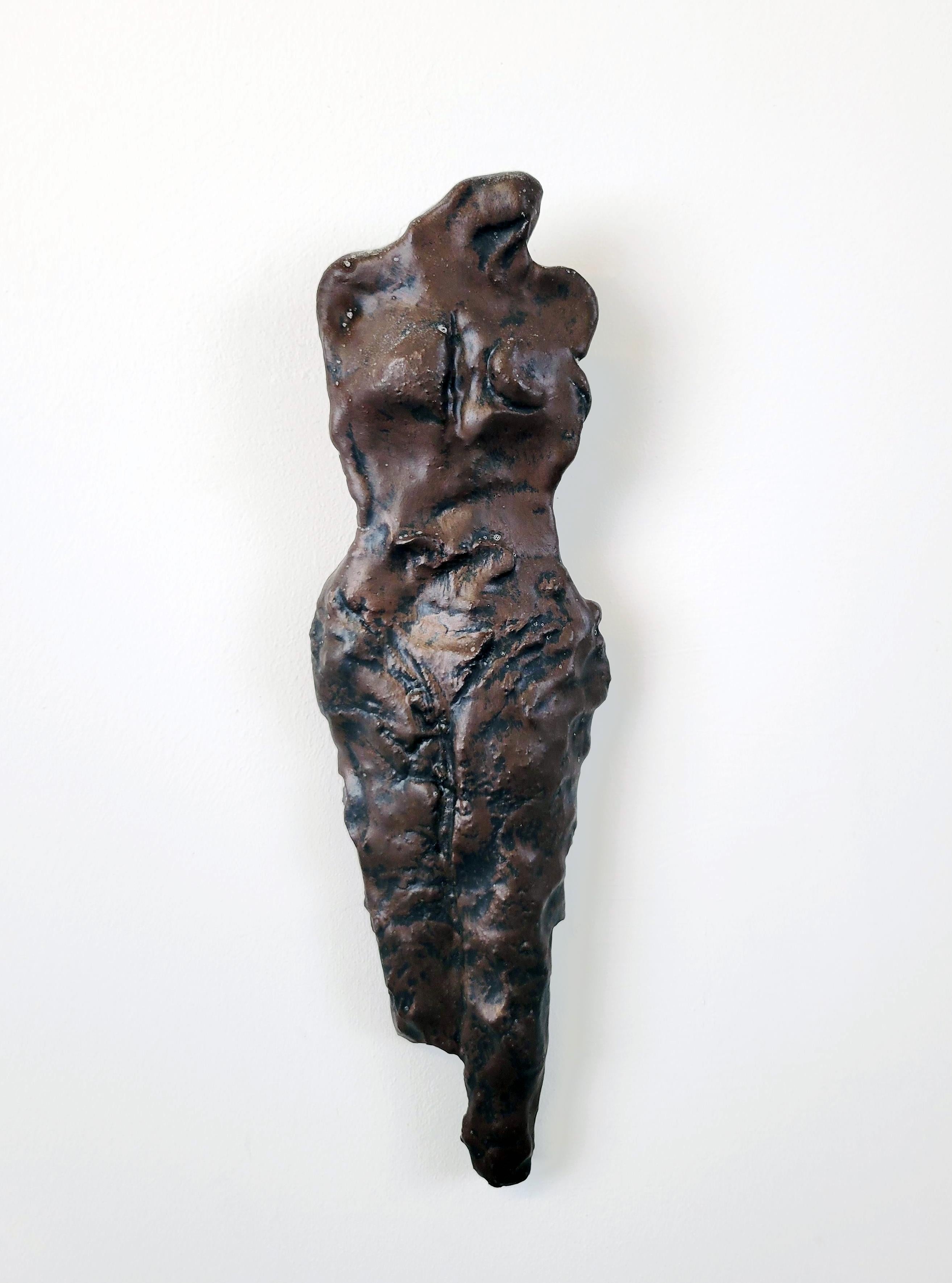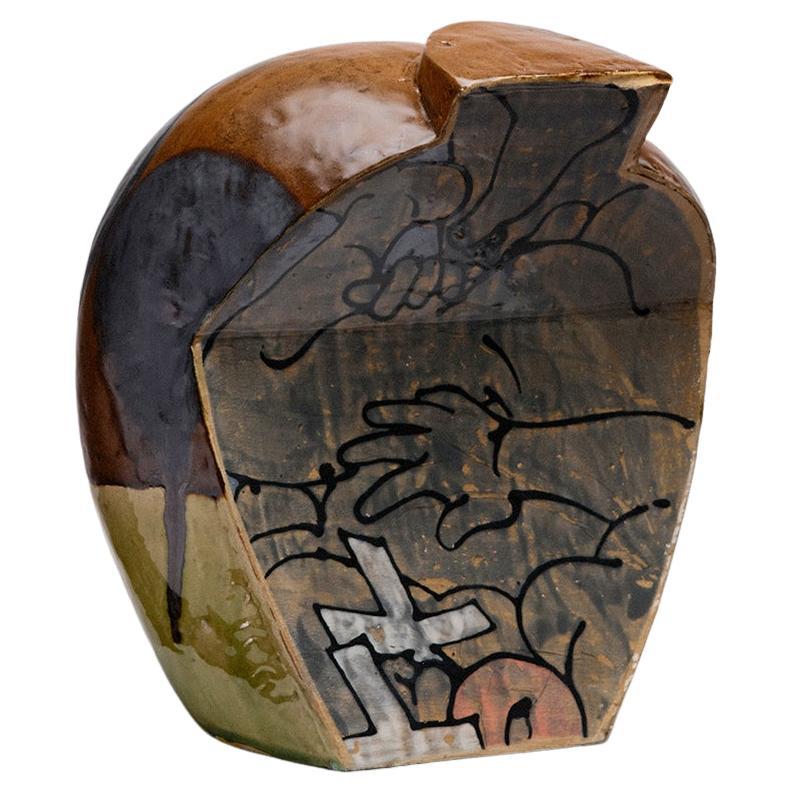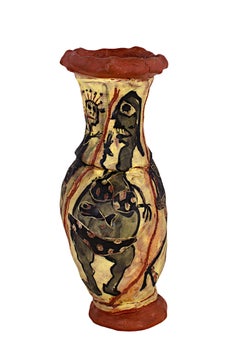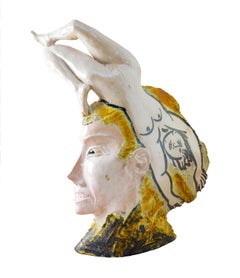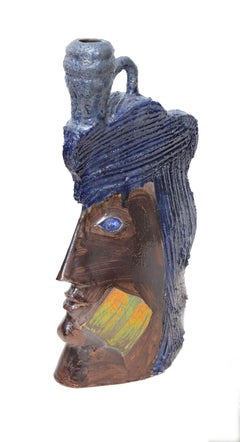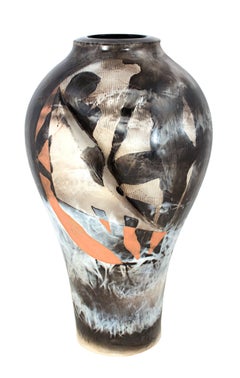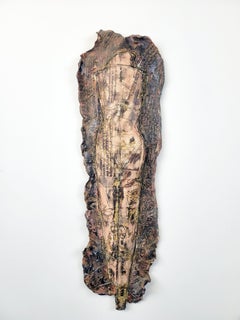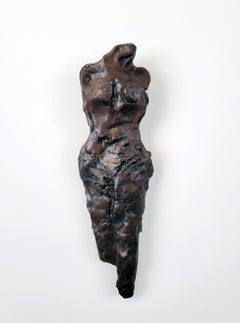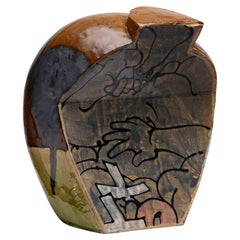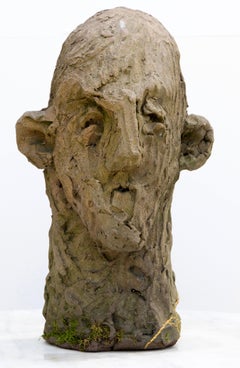Items Similar to 'King of Farts' original ceramic vase and relief signed by Michael Gross
Want more images or videos?
Request additional images or videos from the seller
1 of 4
Michael Gross'King of Farts' original ceramic vase and relief signed by Michael Gross1986
1986
$12,800
£9,666.05
€11,066.74
CA$18,076.95
A$19,735.70
CHF 10,346.62
MX$239,697.65
NOK 129,212.42
SEK 122,010.98
DKK 82,601.40
About the Item
The ceramic sculptures of Wisconsin artist Michael Gross are personal narratives that reveal an unusual mix of earthly magic and primal vitality. The artist works in a variety of forms, including figurines, large vessels and furniture. The present vase is among the top tier of his works from the 1980s, showing multiple playful figures in relief around the vessel. In his Neo-Expressionist style, hearkening to the works of Keith Haring and Jean-Michel Basquiat, the figures are colored in painterly polychrome. Also, not unlike the painted narrative vessels of Ancient Greece, though much more subversive, many of the figures and stories are identified with text: 'King of Fart,' 'Dance Little Sister,' 'Girls for Every Boy,' and 'Beach Boy.'
22 x 13 x 12 inches overall
Signed 'Gross' near base
Dated 1986 near upper rim
SELECTED COLLECTIONS INCLUDING WORKS BY GROSS:
Smithsonian American Art Museum, Washington, D.C.; Sharon Lynne Wilson Center for the Arts, Brookfield, WI (Commission); Arkansas Art Center, Little Rock, AR; Racine Art Museum, Racine, WI; Everson Museum, Syracuse, NY
- Creator:Michael Gross (1920 - 2004, Israeli)
- Creation Year:1986
- Dimensions:Height: 22 in (55.88 cm)Width: 13 in (33.02 cm)Depth: 13 in (33.02 cm)
- Medium:
- Movement & Style:
- Period:
- Condition:
- Gallery Location:Milwaukee, WI
- Reference Number:Seller: 8285g1stDibs: LU60536080962
About the Seller
4.9
Platinum Seller
Premium sellers with a 4.7+ rating and 24-hour response times
Established in 1966
1stDibs seller since 2017
447 sales on 1stDibs
Typical response time: 3 hours
- ShippingRetrieving quote...Shipping from: Milwaukee, WI
- Return Policy
Authenticity Guarantee
In the unlikely event there’s an issue with an item’s authenticity, contact us within 1 year for a full refund. DetailsMoney-Back Guarantee
If your item is not as described, is damaged in transit, or does not arrive, contact us within 7 days for a full refund. Details24-Hour Cancellation
You have a 24-hour grace period in which to reconsider your purchase, with no questions asked.Vetted Professional Sellers
Our world-class sellers must adhere to strict standards for service and quality, maintaining the integrity of our listings.Price-Match Guarantee
If you find that a seller listed the same item for a lower price elsewhere, we’ll match it.Trusted Global Delivery
Our best-in-class carrier network provides specialized shipping options worldwide, including custom delivery.More From This Seller
View All"Untitled Vase, " Neo-Expressionist Ceramic Vase signed by Michael Gross
By Michael Gross
Located in Milwaukee, WI
"Untitled Vase" is an original ceramic vase by Michael Gross. It features abstracted and grotesque figures on a yellow ground.
11 1/2" x 4 1/2" art
The ceramic sculptures of Wisconsin artist Michael Gross are personal narratives that reveal an unusual mix of earthly magic and primal vitality. The artist works in a variety of forms, including figurines, large vessels and furniture. With over a dozen museum exhibitions under his belt, the artist is a regular exhibitor at SOFA in New York...
Category
1980s Neo-Expressionist Figurative Sculptures
Materials
Ceramic
'Can't Get Her Off My Mind' Ceramic Sculpture
By Steven Kemenyffy
Located in Milwaukee, WI
"Can't Get Her Off My Mind" is an original ceramic sculpture created by Steven Kemenyffy.
43"x30"x14"
Ceramic
Steven Kemenyffy (born 1943) is an American ceramic artist living and working in Pennsylvania. He is most recognized for his contributions to the development of the American ceramic raku tradition. He has served as a Professor of Ceramic Art at Edinboro University of Pennsylvania (formerly Edinboro State College) since 1969. He Has retired from teaching, but continues to produce artwork at his home studio in McKean, Pennsylvania. Kemenyffy is often characterized in regard to his contributions to American experimental ceramics of the late 1960s and early 1970s. More specifically, Kemenyffy’s contributions to American raku techniques are often cited. Kemenyffy has stated that his interest in raku came out of practical considerations: “We [Steven and Susan] were doing a variety of workshops in a variety of different media. Raku was always an official way of making pieces in a short period of time…In raku it seems to compress all the firings into one.” Kemenyffy, himself, describes his early work as “Biomorphic forms alluding to old ceramic traditions such as tiles, vases, and containers.” These works were often in excess of six feet tall and many times included mixed media elements. In 1974, Kemenyffy wrote about the work he was producing; “For several years now, my work has dealt with certain formal considerations. Chief among these is using clay in such a way as to crystallize the moment and permanentize the impermanent. These have been among the primary concerns of all potters since the earliest times.” Today, Kemenyffy continues his pursuit of biomorphic imagery and themes. He writes, “Personally I am most challenged by the business of transforming porous organics into porcelain.” For much of Kemenyffy’s career, he has worked in tandem with his wife, Susan Hale Kemenyffy. In 1987 Susan stated about their collaborative works: “Steven is the [sculptor], I am the drawer. These works would not exist if it weren’t for the sculpture; if it weren’t for the clay. The clay entity comes first and my drawings come second.” James Paul Thompson further clarifies this relationship (as observed in 1987): “Steven Kemenyffy uses patterns as a point of departure for his work, while Susan Kemenyffy...
Category
1980s Figurative Sculptures
Materials
Ceramic
'History of Pottery, Africa' Ceramic Sculpture
By Steven Kemenyffy
Located in Milwaukee, WI
41x25x10"
Ceramic
Steven Kemenyffy (born 1943) is an American ceramic artist living and working in Pennsylvania. He is most recognized for his contributions to the development of the American ceramic raku tradition. He has served as a Professor of Ceramic Art at Edinboro University of Pennsylvania (formerly Edinboro State College) since 1969. He Has retired from teaching, but continues to produce artwork at his home studio in McKean, Pennsylvania. Kemenyffy is often characterized in regard to his contributions to American experimental ceramics of the late 1960s and early 1970s. More specifically, Kemenyffy’s contributions to American raku techniques are often cited. Kemenyffy has stated that his interest in raku came out of practical considerations: “We [Steven and Susan] were doing a variety of workshops in a variety of different media. Raku was always an official way of making pieces in a short period of time…In raku it seems to compress all the firings into one.” Kemenyffy, himself, describes his early work as “Biomorphic forms alluding to old ceramic traditions such as tiles, vases, and containers.” These works were often in excess of six feet tall and many times included mixed media elements. In 1974, Kemenyffy wrote about the work he was producing; “For several years now, my work has dealt with certain formal considerations. Chief among these is using clay in such a way as to crystallize the moment and permanentize the impermanent. These have been among the primary concerns of all potters since the earliest times.” Today, Kemenyffy continues his pursuit of biomorphic imagery and themes. He writes, “Personally I am most challenged by the business of transforming porous organics into porcelain.” For much of Kemenyffy’s career, he has worked in tandem with his wife, Susan Hale Kemenyffy. In 1987 Susan stated about their collaborative works: “Steven is the [sculptor], I am the drawer. These works would not exist if it weren’t for the sculpture; if it weren’t for the clay. The clay entity comes first and my drawings come second.” James Paul Thompson further clarifies this relationship (as observed in 1987): “Steven Kemenyffy uses patterns as a point of departure for his work, while Susan Kemenyffy...
Category
1980s Figurative Sculptures
Materials
Ceramic
"Tall Jar with Figures, " Original Ceramic signed by Christine LePage
By Christine LePage
Located in Milwaukee, WI
"Tall Jar with Figures" is an original ceramic by Christine LePage. The artist signed and dated the piece on the bottom. It features silhouettes of figures as...
Category
1980s Contemporary Figurative Sculptures
Materials
Ceramic
"Epoxy Glued Ming Dynasty, " Original Clay Sculpture signed by Reginald K. Gee
By Reginald K. Gee
Located in Milwaukee, WI
"Epoxy Glued Ming Dynasty" is an original acrylic-painted clay sculpture by Reginald K. Gee. The artist signed the piece on the bottom. This sculpture depicts two Asian men without a...
Category
Early 2000s Neo-Expressionist Figurative Sculptures
Materials
Clay, Wood, Acrylic
'Untitled (Man & Woman in bikinis)' Ceramic Bowl, signed and dated
By Michael Gross
Located in Milwaukee, WI
2-1/4 x 7"
Ceramic Bowl, signed and dated verso
The ceramic sculptures of Wisconsin artist Michael Gross are personal narratives that reveal an unusual mix of earthly magic and primal vitality. The artist works in a variety of forms, including figurines, large vessels and furniture. With over a dozen museum exhibitions under his belt, the artist is a regular exhibitor at SOFA in New York...
Category
1980s Sculptures
Materials
Ceramic
You May Also Like
American Contemporary Ceramic Sculpture - Linda Stein, Knight Embedded 534
Located in New York, NY
This sculpture from Linda Stein’s Knights of Protection series functions both as a defender in battle and a symbol of pacifism.
Knight Embedded 534 was exhibited in 2006 at Longst...
Category
2010s Contemporary Figurative Sculptures
Materials
Ceramic
$2,400 Sale Price
20% Off
American Contemporary Ceramic Sculpture - Linda Stein, Knight of Glory 677
Located in New York, NY
This sculpture from Linda Stein’s Knights of Protection series functions both as a defender in battle and a symbol of pacifism.
Stein's works are in more than 25 museum permanent ...
Category
Early 2000s Contemporary Figurative Sculptures
Materials
Ceramic
$2,000 Sale Price
20% Off
Pickled Self-Hatred in Stoneware and Glaze by Malcolm Mobutu Smith
By Malcolm Mobutu Smith
Located in Philadelphia, PA
Malcolm Mobutu Smith
Pickled Self-hatred, 2022
Stoneware, slip and glaze
14 x 16 x 16 in.
Category
21st Century and Contemporary American Abstract Sculptures
Materials
Stoneware
Contemporary Expressionist Ceramic Head in Refractory Stoneware with Kintsugi
Located in FISTERRA, ES
Testa 6 is a contemporary expressionist ceramic head from the ongoing Testas series of sculptural heads. Created in refractory stoneware, the piece is fired in reduction and subseque...
Category
2010s Expressionist Figurative Sculptures
Materials
Clay, Glaze
Large Totem - Glazed Ceramic Sculpture by Marc Zimmerman
By Marc Zimmerman
Located in Carmel, CA
This masterpiece is exhibited in the Zimmerman Gallery, Carmel CA.
Please note: The base is not included. We will guide you through a simple installation process for outdoor or indo...
Category
2010s Contemporary Figurative Sculptures
Materials
Ceramic, Clay, Glaze
Glazed ceramic vase by Patrick Crulis, 2025.
By Patrick Crulis
Located in Saint-Ouen, FR
Glazed stoneware vase by Patrick Crulis.
2025. Unique piece.
H : 23.6 x 12.6 x 11.8 inches.
Approximate sizes.
Category
21st Century and Contemporary French Beaux Arts Ceramics
Materials
Ceramic
More Ways To Browse
Ceramic Reliefs
Ceramic Relief Art
Relief Ceramic Vase
Richard Storms
Robert Bliss
Robert Crane
Robert Cunningham
Robert E Wood
Rock Music Poster
Roger Bonafe
Rolling Stones Exile
Rowe Landscape Oil Painting
Russell Smith
Russian Collage
Salvador Dali Clocks
Sampson Paintings
Scottish Painting Henderson
Sea Painting Gold Frame
